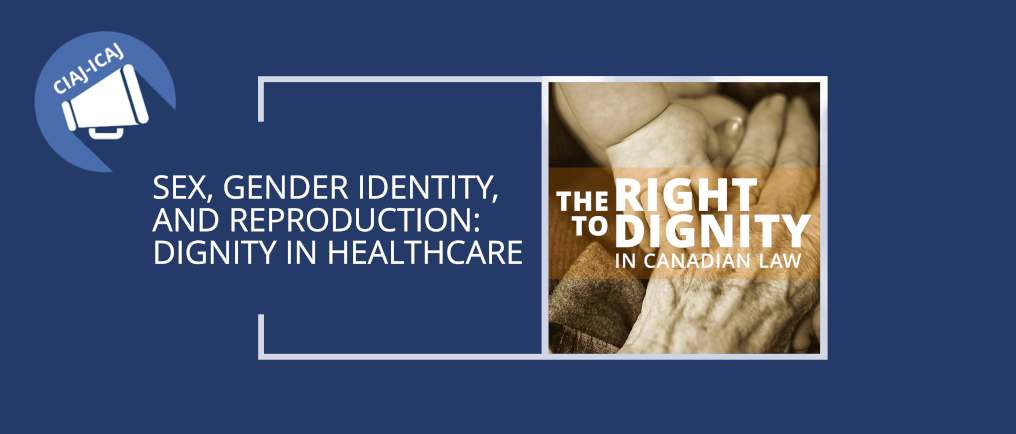Sex, Gender Identity, and Reproduction: Dignity in Healthcare

Trans, intersex, and Indigenous peoples continue to face healthcare-based discrimination in Canada despite the great strides made for human rights in recent decades. This prejudice manifests from seemingly innocuous language on intake forms to forced sterilizations. For example, some institutions have recently implemented “X” as a gender option on medical paperwork in an attempt to be more inclusive. In reality, this catch-all category ignores the intricacies of gender identity and reinforces society’s “male, female, or other” triad. On the other end of the spectrum lies forced and coerced sterilizations. These procedures, which First Nations women are disproportionately subjected to, remain commonplace and have yet to be prohibited by the Criminal Code. These examples are just two of many healthcare related problems that require remedying through novel legislation.
Further, recent developments in Canada and abroad reveal how dignity-based rights can shift. Great advancements can be overturned, and rights can be reinterpreted or changed. The expression of dignity in law is one such right that is particularly susceptible. The recent decision of Ward v Quebec saw a 5:4 split in the Supreme Court of Canada on how the application of the “right to the safeguard of dignity” enshrined in Quebec’s Charter of Human Rights and Freedoms. The majority raised the threshold for the right’s applicability, understanding “dignity as protecting the most “fundamental” attributes of the human being. The rationale was to allow dignity to be argued on its own merits rather than become attached and therefore subsumed by other rights when claimed alongside them. However, harms that can arise everyday in the medical context can span both the mundane and the extreme. Parsing the role of dignity is not an easy task. In the realm of healthcare, particularly regarding groups often ignored or not well protected by our legal order, this becomes particularly fraught. Subtle shifts and changes can cause great harm.
These issues and more will be addressed at CIAJ’s 46th Annual Conference on “The Right to Dignity in Canadian Law,” which will take place October 26-28, 2022 in person in Halifax, NS, and Online. The third panel at the conference will focus on themes relating to sex, gender identity, and reproduction, examining dignity-centric issues faced by Canada’s transgender, intersex, and Indigenous communities through the lens of the healthcare system.
The speakers will cover topics such as the harms of (mis)gendered language in the fields of law and medicine, the pervasiveness of Sexual Orientation and Gender Identity Expression (SOGIE) conversion attempts, concerns surrounding pediatric transgender care, trans rights outside the realm of human rights, and the mass coerced/forced sterilization of Indigenous women.
The session will allow the speakers and attendees to critique Canada’s treatment of trans, intersex, and Indigenous populations within the healthcare system. Attendees will consider policy decisions to restore dignity to these individuals seeking care while also explore the bounds of dignity as it applies in this sensitive field. Join the discussion!
Some seasoned panellists will be offering their expertise and personal experience on Panel 3:
Panel Chair
- The Honourable Justice Elaine J. Adair, Supreme Court, British Columbia
Speakers
- Vanessa Gruben, Associate Professor, Faculty of Law – Common Law Section, University of Ottawa
- Alisa Lombard, Lawyer, Lombard Law
- Joseph Fraser, Director and CEO, Nova Scotia Human Rights Commission
Panel 3 Keywords: transgender, intersex, gender identity, coerced/forced sterilization, donor conceived offspring, pregnancy, reproduction, healthcare, human rights, surrogacy work.
More blog posts on dignity are available on this page: https://ciaj-icaj.ca/en/blog/
Conference Overview
CIAJ’s 46th Annual Conference, entitled “The Right to Dignity in Canadian Law,” will discuss dignity as a fundamental human right. The conference will cover the many facets of the concept of dignity, from moral and philosophical notions to its uses as a legal norm. Discussion of the topic will be grounded in eminently pertinent issues such as the role of dignity in gender identity and reproductive rights, as well as medical assistance in dying, elder care, disability, and equality rights. The role of dignity will also be discussed in the context of the Canadian criminal justice and carceral systems, particularly with regards to Indigenous Peoples, restorative justice, the United Nations Declaration on the Rights of Indigenous Peoples, and reconciliation.
